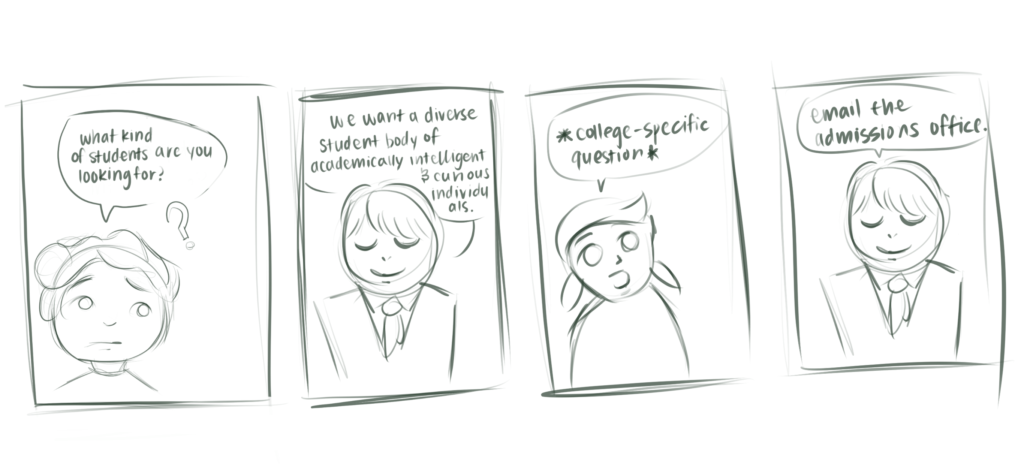“Students interested in learning more about [insert college name], please report to the College and Career Center at the beginning of the tutorial.”
Students eager to depart from their second-period classes are often greeted by these monotonous declarations during daily announcements. On paper, these college representatives’ visits provide valuable insights regarding a particular university and help seniors establish a list of colleges to apply to.
In reality, they are usually unproductive. Not only do these sessions turn into 40-minute advertisements for the schools, but their structure often means they are least beneficial to their primary users: seniors.
The bad: generic information
Finding generic information about a college is as easy as searching on Google for the name of the university followed by “general information” or “student life.” Representatives do not need to spend the bulk of their time talking about the structure of different colleges or, even worse, abstract ideas like the school motto. All of this can be found on the school website.
For those who argue that students shouldn’t be expected to know this information ahead of time, simply attach the relevant key facts to the calendar invite on Naviance. Every student needs to reserve a seat in the College and Career Center anyway, so getting a 2-minute summary or an online pamphlet beforehand can allow representatives to cover more niche aspects of the school and answer more student questions, such as giving a more insightful picture of what life is actually like there by, for example, having a current student walk us through their typical day in college.
Moreover, representatives should replace the cliche “just be yourself because we love diversity” mantras with useful application tips: What types of essays are not recommended? What has stood out to you in the past? Should the SAT be self-reported or sent in an official score report? Prioritizing this type of information realistically reduces the burden on students and the time needed to find out niche tidbits that actually make or break an application.
The worse: overcrowded rooms
Speaking of seat reservations, the entire structure of college visits at the school needs to be reevaluated. The CCC was remodeled for the express purpose of housing college visits in a convenient location. Yet, crowded conditions mean students end up peeking in through the windows and sitting alongside the sink in the back.
There already exists a larger, more acoustically viable place to house visits on campus: the McAfee Center. The first big college visit — from USC — was housed here, but future events all went back to the CCC.
The school can institute specific policies to alleviate some of these grievances. For example, moving all visits to the McAfee and reserving the CCC exclusively for one-on-one or group advising sessions can allow students to actually hear the representatives and have enough seats for everyone.
Even if opening the McAfee isn’t feasible every day, the administration should prevent overcrowding by restricting the sessions to seniors by actually enforcing the Naviance-based registration system.
These rep visits are easily derailed by the non-seniors allowed in. While we understand that some underclassmen might be curious about a specific college, the limited space and the point of the visit being for prospective college students should allow seniors to get priority. Other students can still learn more about these colleges by visiting their campuses or by signing up for virtual information sessions that cover the same topic.
Most likely, these non-seniors come to establish the wonder child of college admissions: “demonstrated interest,” or how interested a student is in attending a specific institution. We hate to break it to you, but the majority of universities don’t consider demonstrated interest. Underclassmen and juniors should be banned from visits from colleges that don’t even consider this factor; attending random college information sessions a year before applications even open is simply unnecessary and inconsiderate to seniors who are in the midst of their applications.
College visits have the potential to be an invaluable tool, but in their current form, they remain a redundant source of information at best and a waste of time at worst.



























